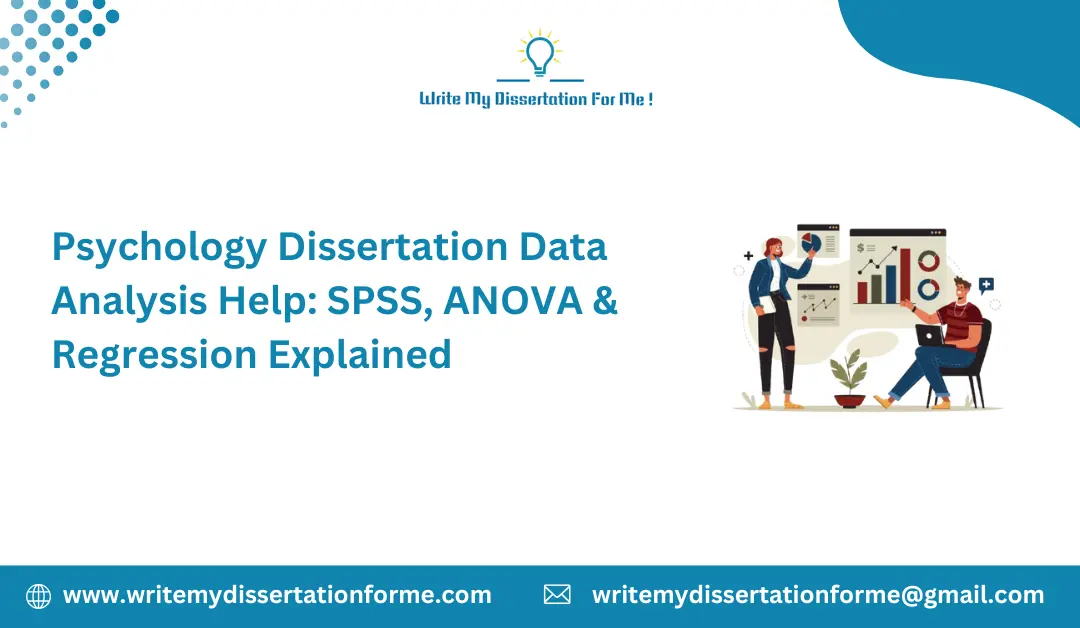Psychology Dissertation Data Analysis Help: SPSS, ANOVA & Regression Explained
October 30 2025 | 05 min read

Writing a psychology dissertation is one of the most difficult but rewarding academic experiences for students pursuing a degree in psychology. It is not enough to simply collect data and write a detailed report; you must also demonstrate your capacity to perform independent research, interpret data meaningfully, and provide valuable ideas to the subject. However, one of the most difficult aspects of this procedure is data analysis.
Understanding how to utilize statistical techniques such as SPSS, ANOVA, and regression analysis is crucial for evaluating survey responses, behavioral observations, or experimental data. This is where Psychology Dissertation Data Analysis Help may make a huge impact.
In this blog, we'll go over the fundamentals of psychology dissertation data analysis, including how SPSS, ANOVA, and Regression techniques are employed, and how expert advice can help you reach accurate and convincing results.
Why is data analysis important in a psychology dissertation?
In a psychology dissertation, data analysis serves as the link between the research question and the findings. It enables you to make sense of raw data, uncover trends, and validate theories. The precision of your analysis influences the overall credibility of your dissertation.
For example, if you're researching the link between stress and work productivity, you may use a standardized questionnaire to collect replies. However, without proper analysis—such as the use of correlation or regression techniques—it is impossible to definitely establish if stress has a major impact on productivity.
This is why many students seek Psychology Dissertation Assistance—to verify that their analytical approach is both methodologically sound and statistically correct.
Understanding Psychology Dissertation Data Analysis:
Psychology Dissertation Data Analysis Help is often provided through the use of specialist statistical tools and analytical procedures designed specifically for psychological research. SPSS (Statistical Package for the Social Sciences) is the most popular tool due to its user-friendly design and powerful statistical capabilities.
Here's what the data analysis process typically involves:
- Data Cleaning and Preparation: Ensure your dataset is error-free, with no missing or inconsistent values.
- Descriptive statistics involves summarizing data using mean, median, mode, standard deviation, and frequency distributions.
- Inferential statistics involves using statistical tests like ANOVA and Regression to uncover significant links and differences between variables.
- Interpretation involves drawing inferences from statistical data and applying them to research ideas and literature.
Seeking expert Psychology Dissertation Help can help you complete these procedures correctly and efficiently, saving time and reducing the possibility of errors.
SPSS for Psychology Dissertation Data Analysis:
SPSS is the foundation for most Psychology Dissertation Data Analysis Help providers. It simplifies statistical testing by allowing users to execute sophisticated analyses with a few clicks.
Key Features of SPSS:
- Data entry and manipulation.
- Descriptive statistics (such as mean, median, and standard deviation)
- Correlation and regression analyses
- ANOVA and t-tests.
- Data presented graphically
How SPSS Can Help With Your Psychology Dissertation:
Let's look at one of the most typical Psychology Dissertation examples:
Assume you are researching the impact of mindfulness training on anxiety reduction among college students. You obtained pre- and post-test anxiety scores from 100 subjects.
Using SPSS, you may
- Enter your information into the software.
- Using Paired Sample t-tests, assess anxiety levels before and after training.
- Create descriptive statistics and visual graphs to improve comprehension.
- Obtain p-values and confidence ranges to assess the statistical significance of your findings.
SPSS ensures precision and efficiency, which is why the majority of Psychology Dissertation Help professionals choose it for exact data analysis.
ANOVA (Analysis of Variance) explained:
Analysis of Variance (ANOVA) is a strong statistical technique used in psychology research to compare the means of three or more groups. It helps to assess whether there are statistically significant differences between the groups.
When to Use ANOVA in a Psychology Dissertation?
ANOVA is very beneficial for:
- You wish to compare the results of various diseases or therapies.
- You're analyzing data from several experimental groups.
In one of the Psychology Dissertation examples, assume you are investigating how several types of therapy—Cognitive Behavioral Therapy (CBT), Psychoanalysis, and Humanistic Therapy—affect depression levels in patients. ANOVA allows you to assess whether there is a significant difference in depression scores between these three groups.
ANOVA types that are commonly used in psychology dissertations:
- One-Way ANOVA is used to analyze data with a single independent variable (e.g., therapy type) and one dependent variable (e.g., depression score).
- Two-Way ANOVA is used with two independent variables (e.g., therapy type and gender).
- Repeated Measurements ANOVA is used to compare the performance of the same subjects across different situations or time periods.
Benefits of Using ANOVA:
- It allows you to compare numerous groups at once.
- It aids in identifying inter-variable relationships.
- It reduces the likelihood of Type I errors while doing repeated t-tests.
Experts provide Psychology Dissertation Data analysis Ensure that the appropriate form of ANOVA is employed based on your research design and data structure.
Regression Analysis for Psychology Dissertations:
Regression analysis is another essential component of data analysis in psychological research. It contributes to understanding how one or more independent factors predict a dependent variable.
Why Does Regression Analysis Matter?
Regression is frequently employed in Psychology Dissertation Examples when researchers want to predict results or uncover correlations between variables. For example:
- Predicting academic achievement using motivation and study habits.
- Investigating how self-esteem and social support affect anxiety levels.
- Investigating how emotional intelligence influences job satisfaction.
Types of Regression Analysis:
- Simple Linear Regression examines the relationship between one independent and one dependent variable. Example: predicting stress levels based on sleep duration.
- Numerous regression uses numerous independent variables to predict one dependent variable. For example, predicting academic performance using motivation, study time, and social support.
- Logistic regression is used for categorical dependent variables, such as yes/no outcomes.
Regression analysis allows academics to get deeper insights into psychological data and construct models that better explain human behavior.
When you seek Psychology Dissertation Data Analysis Help, professionals can assist you in selecting the appropriate regression model, correctly interpreting coefficients, and clearly presenting your findings.
The Role of Expert Psychology Dissertation Assistance:
Many students are intimidated by statistical analysis, particularly complicated tests such as ANOVA and regression. Professional Psychology Dissertation Help is really useful in this situation.
Experienced statisticians and academic experts can do:
- Select the most appropriate analysis approaches for your research topics.
- Manage SPSS data entry and interpretation.
- Use clear tables, charts, and graphs to present your data.
- Assist you with writing the Results and Discussion chapters in accordance with APA standards.
Furthermore, Psychology Dissertation Help firms frequently offer extensive Psychology Dissertation examples to help you comprehend the structure, flow, and analytical presentation that is needed in academic research.
Final Thoughts:
Data analysis is the foundation of any successful Psychology dissertation. Even the best-designed research can fall short of reaching relevant conclusions if statistical testing and interpretation are not reliable. Tools like SPSS and methodologies such as ANOVA and Regression Analysis enable researchers to derive useful insights from raw data, but mastering them requires practice and expertise.
If you're feeling overwhelmed by data analysis, getting Psychology Dissertation Data Analysis Help is a wise choice. It ensures correctness, saves time, and boosts your dissertation's reputation.
Remember that a well-analyzed dataset not only supports your conclusions but also improves your overall research.
If you loved reading this, please share this,
also read

Top Reasons Dissertation Proposals Get Rejected and How to Avoid Them
Writing a dissertation proposal is the first major step toward completing your academic journey. However, many students have ...

Components of the Research Proposal
A well-written research proposal is the cornerstone of any successful research study. Whether you are working on a dissertati...

Need Help with Your Business Dissertation? Here’s How We Can Write It for You
Writing a dissertation on business is a difficult task. It requires in-depth study, accurate analysis, and a command of acade...